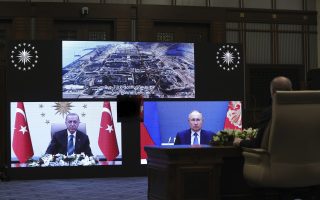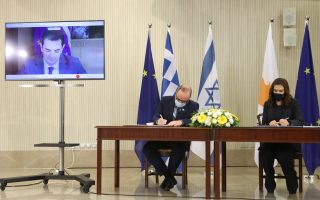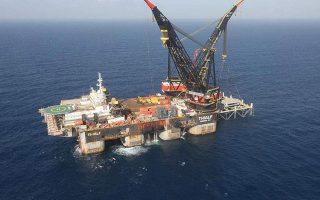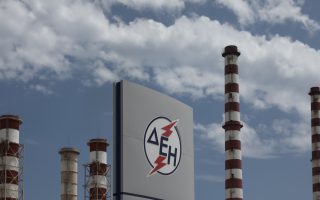EastMed and the new circumstances

In May 2020, the Greek Parliament ratified (Law 4687/2020), by a broad majority, the intergovernmental agreement of Greece, Cyprus, Israel and Italy on a gas transportation system from the Eastern Mediterranean to European markets, the EastMed pipeline. Surprisingly, only the first three countries signed the agreement. Italy’s name remained in the document, but the signature was not added. It simply stated its support for the project in a letter.
At the same time, many people were confusing the EastMed pipeline with the EastMed Act (Eastern Mediterranean Security and Energy Partnership Act of 2019), introduced in the US Senate by Senators Bob Menendez and Marco Rubio, or with the international organization EastMed Gas Forum, which includes eight (at the current moment) actors of the region.
During the 2012-15 period, in collaboration with Yannis Maniatis, we tried to elaborate on the sustainability of the pipeline and promote the project, realizing that a project of this scale could only be adopted, financed, built and operated if it was technically and financially feasible and viable, but also if it was politically acceptable to the critical players. It was therefore certain from the outset that such a plan would be linked to the delimitation and utilization of the continental shelf and the exclusive economic zone, as well as to the projection of European markets’ needs for natural gas in the next 30 years or so, and thus to the prediction of the shape and pace of the green transition and the role of natural gas as a transitional fuel under the pressure of climate crisis. The EastMed project was therefore primarily a political one from the start.
The bottom line of all my interventions regarding the delimitation of these maritime zones in the Eastern Mediterranean and especially between Greece and Turkey is that time tends to reduce or even eliminate the economic and political importance of fossil fuels as a natural and therefore economic and political object. Forty-seven years after the Metapolitefsi, we cannot have the same comfortable sense of time for the next 47 years.
It is therefore very interesting to see how Greece perceives the position of the US administration – stated recently in various ways – that it does not support (politically, obviously, but this is also a message to the market) the EastMed project, while it attaches political importance to its energy cooperation with Greece, Cyprus and Israel. In the context of this cooperation, however, it is turning its attention to the electrical interconnection of Egypt with Crete and the Greek mainland (EuroAfrica Interconnector) and the electrical interconnection of Israel and Cyprus with the European networks (EuroAsia Interconnector). These projects are vital and prepare the region for the clean energy transition. The electricity diverted through the interconnectors will of course be generated (as far as it is feasible and safe in the areas outside Europe where the power plants are located) from renewable sources and to a very large extent from natural gas, although, obviously, new infrastructure, such as the EastMed pipeline, is not supported. Therefore, this favors infrastructure for liquefied or compressed natural gas, or existing pipelines and the countries of origin (e.g. Russia) and transit (e.g. Turkey).
If it turns out, as is very likely, that a similar political positioning of the US administration is sufficient for the countries that have signed a relevant transnational agreement to practically abandon a project such as the EastMed pipeline, which is under study by choice and funding of the EU, then we urgently need to rethink what exactly is the strategic framework in which our actions are placed, in the most sensitive field of foreign policy, which is Greco-Turkish relations, a key element of which is the delimitation of maritime boundaries. We also need to rethink whether all the parameters of the green transition in our country and the way in which the use of natural gas is integrated into the long transition period have been fully researched. When I say way, I mainly mean security and adequacy of supply, availability of the necessary infrastructure and price variation.
There is of course always the easy answer, that such projects are evaluated by the market based on business criteria. According to this logic, however, we should accept that, for example, the consortium with Total and ExxonMobil at its core can, as it already appears, freeze the exploration in the blocks south and west of Crete for which concession agreements have been concluded with the Hellenic Republic. These are, I remind you, areas with a high probability of very significant deposits, according to the estimates of the Hellenic Hydrocarbon Management Company. I hope it is obvious that the decision on how to shape our relationship with these natural resources certainly takes into account the stance of the market and the large international companies. However, it is an important national decision. A decision that must be taken on pragmatic criteria. It should be taken though – we should not let time slip by, nor should inaction be perceived as active policy-making. The recent developments in the international energy market, the degree to which the price of natural gas is affected or rather skyrocketing for reasons largely linked to international politics, make the close relationship between foreign and energy policy absolutely obvious. In any case, the International Law of the Sea, to which we constantly refer, also regulates to a large extent energy-related issues.
I had stated (Kathimerini Sunday, 02/01/2022) that the international developments that are reshaping the world map, and essentially the spheres of influence in the wider European area, may alter the context in which Greco-Turkish relations and the Cyprus issue evolve, with the role of the countries directly concerned being reduced, since the decisive factor will be the higher level – e.g. relations between the USA and Russia, which also determine relations between NATO and Russia and ultimately relations between the USA and China. These new correlations also determine the margins of flexibility for regional players. It might be that the issue of the EastMed pipeline is a first practical indication of how the new system of international relations operates at a political and energy-related level. However, we must seek and examine all the contextual data in the field of both foreign policy and energy policy.
Evangelos Venizelos is former deputy prime minister, minister of foreign affairs and minister of development (and energy).





